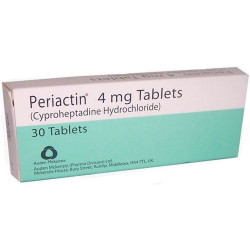Periactin (cyproheptadine) Coupons, Discounts & Cost
Periactin is an antihistamine and anti-allergic drug. One way to save money on the Periactin retail cost regardless of income and insurance status is to use Periactin coupons or discount cards from RXCoupons. Use this Cyproheptadine coupon at this online pharmacy and receive up to 75% off the sale price.
Periactin (cyproheptadine) mechanism of action
Periactin is an antihistamine and anti-allergic drug. Cyproheptadine lowers the body's response to histamine, prevents allergic reactions and edema. It has a weak sedative effect.
Cyproheptadine is rapidly and completely absorbed from the GT. The maximum concentration is achieved within the first 2 hours.
Periactin main indications: urticaria (acute, chronic), hay fever, serum sickness, year-round or seasonal allergic rhinitis, allergic conjunctivitis, angioedema, allergic reactions to medicines and X-ray contrast agents, allergic reactions associated with blood transfusion, allergic reactions to insect bites, itchy dermatitis, contact dermatitis, atopic dermatitis, eczema. Periactin is sometimes used to treat headache of vascular origin (migraine), vasomotor rhinitis, anorexia, cachexia (in chronic diseases). It can be also included in the complex therapy of chronic pancreatitis.
What are the contraindications for Periactin?
Do not take Periactin in case of hypersensitivity, angle-closure glaucoma, benign prostatic hyperplasia, urinary retention, pyloroduodenal obstruction, stenosing peptic ulcer, pregnancy, lactation. Simultaneous administration with MAO inhibitors is not recommended. The drug is not used in infants up to 6 months.
Use with caution
Use caution in children and elderly patients (high risk of hypersensitivity), in patients with bronchial asthma, hyperthyroidism, high eye pressure, hypertension and other diseases of the cardiovascular system.
Pregnancy and lactation
There are no well-controlled studies in humans. Try to avoid using Periactin during pregnancy and lactation. The drug is not recommended due to increased excitability in infants. Therefore, women taking Periactin should stop breastfeeding.
What is the dosage for Periactin?
It is recommended to start taking the drug in the evening after a meal (Periactin treatment may cause sedation).
Adult dose - 4 mg three times a day. Treatment of chronic urticaria - 2 mg three times a day. Acute migraine attack - 4 mg at once (4 mg after 30 minutes in the absence of the effect). Maintenance therapy - 4 mg 3 times a day. Anorexia - 12 mg in three divided doses (the maximum daily dose - 32 mg). The duration of treatment should not exceed 6 months (if you take this drug to increase body weight).
Children from 6 months to 2 years (in special cases only) - 0.4 mg/kg per day for 3-4 weeks; 2-6 years - 6 mg daily; 6-14 years - 12 mg daily. Children with anorexia - up to 8 mg per day in 3 divided doses. The duration of the treatment in anorexia and cachexia should be less than 3 months. The maximum daily dose for children of 2-6 years is 8 mg, 6-14 years - 16 mg.
What are the side effects for Periactin?
Nervous system: weakness, sedation and sleepiness, anxiety, headache, dizziness, ataxia, visual hallucinations.
Cardiovascular system and hemostasis: hypotension, tachycardia, hemolytic anemia, leukopenia, agranulocytosis.
Digestive tract: dry mouth, nausea, vomiting, diarrhea.
Allergic reactions: rash, angioedema, urticaria, anaphylaxis, photosensitivity.
Other reactions: weight gain.
Overdose symptoms in children - mydriasis and immobility of the pupils, facial flushing, hyperthermia, agitation, anxiety, hallucinations, ataxia, convulsions, collapse, coma.
Overdose symptoms in adults - confusion, depression, coma, agitation, convulsions; rarely - hyperthermia and facial flushing.
Periactin interactions
Caffeine, sedatives, hypnotics, anxiolytics should be used with caution with cyproheptadine.
Concomitant use of cyproheptadine with other drugs that affect the central nervous system is not recommended.
Cyproheptadine should not be taken together with MAO inhibitors. MAO inhibitors and tricyclic antidepressants can prolong and enhance the effect of cyproheptadine.

